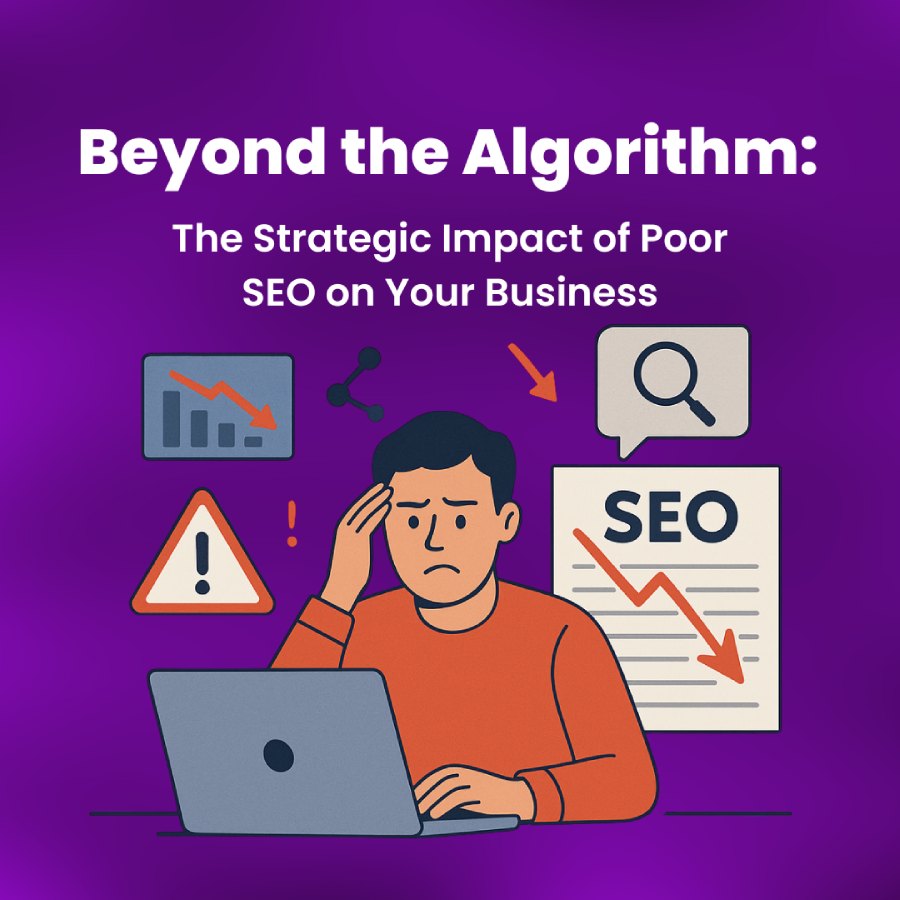In today’s digital landscape, Search Engine Optimization (SEO) is often seen as a technical task or a “game” with the algorithm. However, this view is a strategic mistake. Google doesn’t “punish” websites; its algorithm, a complex machine designed to reward value, simply filters out those that fail to meet the highest standards of quality and relevance.
Poor SEO isn’t a simple technical error; it’s a strategic gap that sabotages the very foundation of your digital presence. Its consequences extend far beyond a drop in rankings, directly impacting your brand’s authority, revenue streams, and the efficiency of your entire marketing spend.
The Strategic Consequences of Bad SEO
The impact of poor SEO practices manifests in tangible results that affect a business’s bottom line.
The Erosion of Digital Authority and Trust
Your domain authority is your brand’s reputation in the digital world. Practices like using low-quality links or publishing duplicate content send signals of untrustworthiness to Google. This not only degrades your rankings but also erodes the perception of your brand as a reliable source in your industry. Over the long term, rebuilding this authority is a costly and slow process.
Loss of Qualified Traffic and Sales Opportunities
When your pages drop in ranking, you lose visibility to an audience that is actively searching for solutions. Potential customers who would have found your products or services organically now go to your competitors. The direct result is a decrease in qualified traffic, an increase in customer acquisition costs, and, ultimately, a contraction of your business opportunities.
Inefficient Marketing Investment
Poor SEO makes the rest of your marketing ecosystem less effective. For example, a landing page that loads slowly or isn’t optimized for mobile (not to mention all the other pages on your site) will have a lower conversion rate, regardless of how much you spend on advertising. This drives up the cost of your paid campaigns (PPC) and reduces your overall return on investment (ROI).
Tactics That Sabotage Your Strategy
Google’s penalties are a manifestation of a lack of strategic focus. Here are the counterproductive tactics that compromise your long-term success:
- Low-Value Content Strategies: Creating superficial content or simply reformulating existing ideas fails to build authority. The strategic goal should be to become a unique source that solves your audience’s problems with genuine value.
- Spam and Manipulation Techniques: Practices like “keyword stuffing” or buying low-quality “backlinks” are attempts to manipulate the algorithm. Google has evolved to detect and severely penalize these tactics because they aim to deceive the system, not serve the user.
- User Experience (UX) Gaps: A slow, hard-to-navigate, or non-mobile-friendly site is a clear signal to Google that your website is not the best option. From a strategic perspective, poor UX translates into a loss of trust and a high bounce rate.
The Strategic Approach: Building Digital Assets
The strategic lesson is clear: stop viewing SEO as a checklist and start seeing it as an investment in digital assets for your business. A strategic approach focuses on building an online presence that is valuable, relevant, and trustworthy.
- Prioritize User Experience: Ensure your site is fast, secure, and intuitive to navigate.
- Create Pillar Content: Develop high-quality, in-depth content that positions your brand as a thought leader.
- Build Authority Ethically: Earn natural links through strategic partnerships and content that is genuinely worth sharing.
By adopting this mindset, you will not only avoid Google’s penalties but also build a robust digital foundation that generates sustainable growth and a demonstrable ROI over time.












